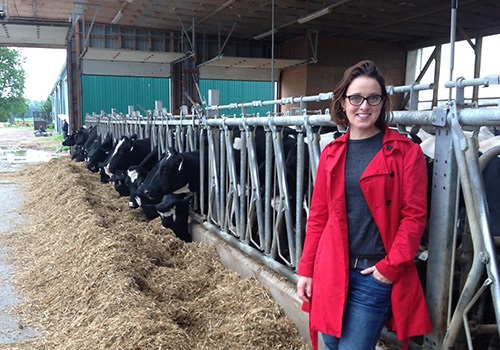
The University of Guelph has received $2.4-million from the federal government through two new Canada Research Chairs (CRC) and the renewal of an existing chair.
Prof. Emma Allen-Vercoe, Department of Molecular and Cellular Biology, will receive a new Tier 1 chair in Human Gut Microbiome Function and Host Interactions. Prof. Christine Baes, Department of Animal Biosciences, will hold a new Tier 2 chair in Livestock Genomics. An existing Tier 2 chair was renewed for Prof. Amy Greer, Department of Population Medicine in the Ontario Veterinary College.
Canada Research Chairs are funded by the Natural Sciences and Engineering Research Council, the Social Sciences and Humanities Research Council and the Canadian Institutes of Health Research.
U of G now has 30 chairholders in a range of disciplines across campus. The appointments and renewals were announced recently by the federal government. As acknowledged international leaders in their fields, Tier 1 chairholders receive $200,000 a year for seven years. Tier 2 chairs are for potential world leaders in their fields and are worth $100,000 a year over five years.

“This latest investment from the CRC program in outstanding U of G researchers highlights the research excellence of our faculty, and emphasizes U of G’s reputation as a top comprehensive, research-intensive university in Canada,” said Malcolm Campbell, vice-president (research).
“It also elevates U of G’s strengths in ‘One Health,’ as these researchers are involved in cutting-edge initiatives at the intersection of human, animal and environmental health. Their research will lead to groundbreaking discoveries and fuel impactful innovations that address some of the world’s most pressing challenges. The CRC support will allow them to put their research into action and help improve life.”
MP Lloyd Longfield added: “The continued contributions from researchers at the University of Guelph are focused on improving life, advancing knowledge and attracting new talent from around the world in support of local, national and international goals. Guelph continues to compete successfully for funding, drawing attention to our wonderful community of collaborators.”
Allen-Vercoe will receive $1.4 million over seven years to extend her studies of the gut microbiome and its effects on human health and disease.
In her U of G lab, she has already developed potential microbial therapeutics to treat C. difficile infections, colorectal cancer, diabetes, inflammatory bowel disease, depression and anxiety, and illnesses in preterm babies.
Earlier this year, Allen-Vercoe was named to an international research team of 14 scholars from five countries studying connections between microbes in the body and cancer, with backing from a $25-million award under the world’s most ambitious cancer research grant.
Receiving $500,000 over five years, Baes uses whole genome sequencing to identify genetic variations for desirable traits in livestock.

In dairy cows, those traits include faster weight gain or more milk production. In poultry, she looks at genes that improve turkey health, welfare and productivity.
For both cattle and poultry, Baes also studies genetics of feed efficiency to help reduce greenhouse gases. She holds the Semex – Canadian Dairy Network – Holstein Canada Professorship in Dairy Genomics.
Greer, whose Tier 2 chair in Population Disease Modelling was renewed, studies the impacts of infectious diseases in humans and animals. By developing disease transmission models, she aims to improve control strategies and inform public health decision-making.